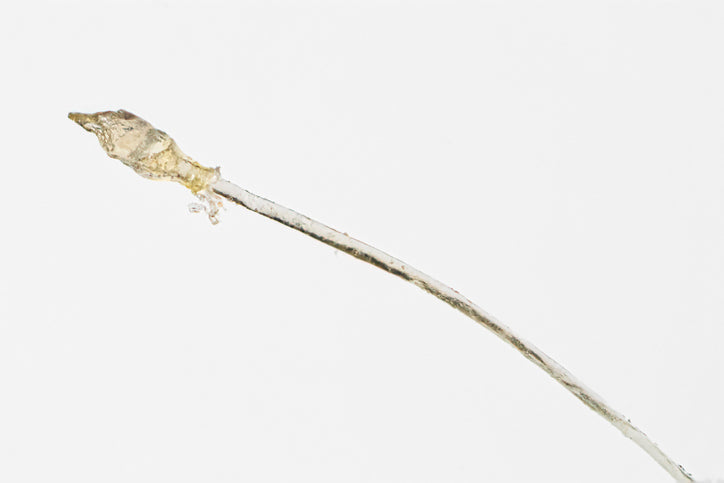There are many causes for hair loss, including being exposed to a fungus. There are millions of fungi in the world. The microscopic organisms live everywhere, including in the soil, on plants and even on your skin. Keep reading to learn how fungus can cause hair loss and what you can do about it. Plus, find out about the products you can use to support fuller looking hair.
What Is a Fungal Infection?
Though they're likely an unpopular dinner table topic, fungal growth and infections are surprisingly common in both men and women. Fungi thrive in warm, damp environments and can quickly multiply if they penetrate a cut or a lesion on the skin. Common types of fungi include mushrooms, yeasts, molds and pathogens. Infections often spread via physical contact, such as an infected animal or person — or via clothing, towels or bedding that are harboring fungi.
Fungal diseases can be very itchy and cause discoloration of the skin. Common fungal infections include vaginal yeast infection, ringworm and athlete's foot. Athlete's foot is very common in people who wear sneakers to vigorously exercise. This is because sneakers can store moisture and encourage yeast to brew on the foot when they're next worn. Though irritating and often uncomfortable, infections are generally considered easy to treat with antifungal creams or pills.
Shop: GRO Collection for Thicker, Fuller Looking Hair
Can a Fungal Infection Cause Hair Loss?
Dermatologist Dr. Harikiran Cheruki said that fungus is a common cause of hair loss, especially in those who have a weakened immune system.
Many fungal infections that develop on the scalp are a result of scalp ringworm, aka tinea capitis. When tinea capitis forms on the scalp, it usually begins as a small pimple and expands in size. The fungus can progress and leave scaly patches on the skin. Areas affected by tinea capitis can blister, be itchy and become red and inflamed. Someone might experience bald patches and temporary hair loss if severe inflammation impacts the affected area.
Dr. Chekuri explained, "Fungus can cause hair loss in several ways. It can directly damage the hair follicle, leading to inflammation and scarring. It can also cause an infection of the scalp that leads to hair loss. Finally, fungus can weaken the hair shaft, making it more susceptible to breakage."
Patches of tinea capitis are usually red around the outside with a light color in the center, creating an impression of a ring — hence the name ringworm.
The fungus Microsporum audouinii is a very common cause of scalp ringworm, but commonly, in the U.S., trichophyton tonsurans might also trigger tinea capitis. You catch ringworm from the soil, and typically, pets — cats, in particular, are carriers — but ringworm doesn't have anything to do with worms or any other parasite. Symptoms of tinea capitis include:
- Mild itching that increases and causes discomfort over time.
- Small areas of hair loss that gradually increase.
- A black-dotted appearance across the hairline where the hair has snapped close to the root.
- Raised, scaly skin around the hair follicles.
- A rash or infection on other parts of the body.
Piedra
Piedra or trichomycosis nodularis is a less common fungal infection that can lead to hair loss. A piedra infection can affect hairs across the body, including around the genital areas.
There are two types of piedra: white piedra and black piedra. Black piedra is caused by the fungus Piedraia hortae and is generally found in tropical countries. White piedra is caused by the fungi Trichosporon beigelii and other fungi commonly found in Southern parts of the U.S. and Europe. When the infection is bad and the skin is seriously impacted, affected hair becomes weak and breaks off easily.
Seborrheic Dermatitis
Seborrheic dermatitis is a non-contagious skin condition that's characterized by redness, flaking and oily or dry scales. Seborrheic dermatitis can increase Malassezia yeast found on the skin, which can result in an overgrowth of yeast and inflammation. The inflammation can result in itching and scratching that damages the hair follicles, which can result in hair loss. Thankfully, hair loss related to these conditions is typically temporary.
Related: Can Infections Cause Hair Loss?
Caring for Hair After a Fungal Infection
Thankfully, treating tinea capitis and other fungal infections is generally pretty straightforward, especially if caught early. If you suspect seborrheic dermatitis, scalp ringworm or any fungal infection on your scalp, visit a doctor for treatment.
Dermatologists will take hair and skin samples to reach a diagnosis. Once the fungal infection is identified, the best treatment is prescribed. Treatment might be an antifungal medication or, in some cases, antibiotics. Treatment might also include antifungal shampoos, which are often used alongside medication and contain sulfur, zinc pyrithione, salicylic acid and selenium sulfide. Azole-based shampoos have also recently gained popularity in the treatment of seborrheic dermatitis.
Once your fungal infection has been treated, apply GRO Hair Serum, which uses a unique blend of vegan ingredients to revitalize hair roots and soothe the scalp gently.
To prevent the risk of a contagious fungal infection, keep your hair clean and avoid sharing combs, brushes and hats with other people. Also, discuss how to prevent any non-contagious fungal infection from arising again with your medical provider.
Check Out GRO Hair Serum Reviews
The Final Word
Fungal infections and fungus hair loss are surprisingly common. Thankfully, they're easy to treat and aren't usually serious — though they can cause distress and discomfort. However, if a fungal infection goes untreated, other complications can result.
To keep hair healthy, gorgeous and glossy, take precautions to avoid fungus and change up your haircare routine by including products that take a natural approach to improve the wellness of your hair and scalp.
#include-related-slider#
More From VEGAMOUR
- What Causes Hair Loss? Every Trigger Explained
- Hair Loss vs. Hair Breakage: The Difference (and Why It Matters)




















